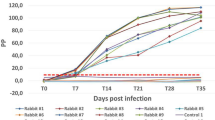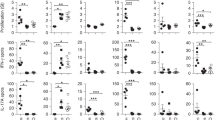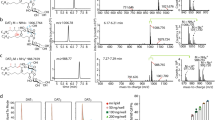Abstract
ALLOGRAFT immunity and delayed hypersensitivity reactions are caused chiefly by the action of host immune lymphoid cells1. Although these reactions have been much studied in vivo and in vitro, the mechanism of cell destruction is essentially unknown. There have been reports from this laboratory that a cell-free toxic factor released by immune and phytohaemagglutinin (PHA)-stimulated non-immune mouse lymphocytes is essential in the in vitro destruction of target L cells2. This factor, termed lymphotoxin (LT), caused in vitro cytolysis of both continuous and primary cells obtained from many animal species3. Later work showed that lymphocytes from various animal species, including man, could be stimulated in vitro to release LT, in the absence of target cells, by treatments which induce lymphocyte transformation, that is the mixed lymphocyte reaction, PHA and xenogeneic antibody4. It was therefore of interest to investigate whether lymphoid cells obtained from animals with delayed hypersensitivity to soluble antigens could be induced in vitro to release LT-like materials. We wish to report here that in the case of tuberculin hypersensitivity in mice, guinea-pigs and man, non-specific toxic materials are released when the cells are cultured in the presence of specific antigen.
This is a preview of subscription content, access via your institution
Access options
Subscribe to this journal
Receive 51 print issues and online access
$199.00 per year
only $3.90 per issue
Buy this article
- Purchase on Springer Link
- Instant access to full article PDF
Prices may be subject to local taxes which are calculated during checkout
Similar content being viewed by others
References
Gorer, P. A., Adv. Cancer Res., 4, 149 (1956); Weaver, J., Algire, G., and Prehn, R. T., J. Nat. Cancer Inst., 15, 1737 (1958). Chase, M. W., Proc. Soc. Exp. Biol. and Med., 59, 134 (1915).
Granger, G. A., and Kolb, W. P., J. Immunol., 101, 111 (1968).
Williams, T. A., and Granger, G. A., Nature, 219, 1076 (1968).
Granger, G. A., Kolb, W. P., and Williams, T. W., in Cell Recognition Processes (edit. by Good, R. A., and Smith, R.) (National Foundation Press, in the press).
Granger, G. A., and Williams, T. W., Nature, 218, 1253 (1968).
Oppenheim, J. J., Fed. Proc., 27, 21 (1968).
David, J. R., Proc. US Nat. Acad. Sci., 56, 72 (1966). Bloom, B., and Bennet, B., Science, 153, 80 (1966). Bennet, B., and Bloom, B., Transplantation, 5, 996 (1967). Bennet, B., and Bloom, B., Proc. US Nat. Acad. Sci., 59, 756 (1968).
Ruddle, N., and Waksman, B. H., Science, 157, 1060 (1967).
Perlman, P., and Holm, G., in Immunopathology (edit. by Miecher, P., and Grabar, P.), 325 (Grune and Stratton, 1967).
Author information
Authors and Affiliations
Rights and permissions
About this article
Cite this article
GRANGER, G., SHACKS, S., WILLIAMS, T. et al. Lymphocyte in vitro Cytotoxicity: Specific Release of Lymphotoxin-like Materials from Tuberculin-sensitive Lymphoid Cells. Nature 221, 1155–1157 (1969). https://doi.org/10.1038/2211155a0
Received:
Revised:
Issue Date:
DOI: https://doi.org/10.1038/2211155a0
This article is cited by
-
The unexpected role of lymphotoxin β receptor signaling in carcinogenesis: from lymphoid tissue formation to liver and prostate cancer development
Oncogene (2010)
-
Mycobacterium Tuberculosis-Induced Cell Death of Primary Human Monocytes and Macrophages Is Not Significantly Modulated by Tumor Necrosis Factor-Targeted Biologicals
Journal of Investigative Dermatology Symposium Proceedings (2007)
-
TNF ligands and receptors – a matter of life and death
British Journal of Pharmacology (2002)
-
Autochthonous grafts of spontaneous mammary tumors implanted together with allogeneic tissues
Zeitschrift f�r Krebsforschung und Klinische Onkologie (1974)
Comments
By submitting a comment you agree to abide by our Terms and Community Guidelines. If you find something abusive or that does not comply with our terms or guidelines please flag it as inappropriate.



